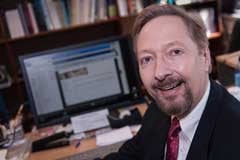 KINGSTON, R.I. – March 4, 2015 – While tragic, the murder of prominent Russian opposition leader Boris Y. Nemtsov will not have much impact on the country’s politics, says a University of Rhode Island political science professor.
KINGSTON, R.I. – March 4, 2015 – While tragic, the murder of prominent Russian opposition leader Boris Y. Nemtsov will not have much impact on the country’s politics, says a University of Rhode Island political science professor.
Nicolai N. Petro, an expert on Russian history and politics, says that Nemtsov was highly critical of not only President Vladmir Putin but also his former liberal allies who chose to work with Putin.
That principled stance had a price: Ordinary citizens blamed the intransigence for the failure of Russian liberalism, says Petro, in an article published Feb. 28 by The National Interest magazine.
“Nemtsov was not regarded as being an intellectual driving force for liberalism, but rather a pure politician,” Petro says. “It is thus likely that Boris Nemtsov’s tragic death will have little lasting impact on Russian politics.”
“To be sure, it will reinforce the narrative of Putin’s authoritarianism in the West, but that can hardly be made any worse,” he says. “Within Russia itself, while there will be many who will view him as a martyr, others will regard him as an exceptionally gifted politician, who in the end could not, or would not, compromise on his principles.”
URI’s Marketing and Communications Office talked to Petro about Nemtsov’s murder Feb. 27 and what lies ahead for the Russian people.
More than 50,000 people demonstrated in Moscow following Nemtsov’s murder. This seems like a very large crowd. How can you say his death won’t change politics in Russia?
Demonstrations gathering tens of thousands in Moscow are hardly a rarity – the “Anti-Maidan” rally is one example. In the instance of the Nemtsov demonstration, I suspect that many turned out to pay their respects to Nemtsov the person, rather than to declare their political allegiance.
News reports say Nemtsov was about to reveal misdeeds in the Kremlin about Russian involvement in the war in Ukraine. Do you believe this?
In recent years Nemtsov co-authored several reports on official misconduct and corruption. This would have been his latest. Given the assertions of Western government and military officials about Russian involvement, always flatly denied by the Kremlin, it is hard to imagine that his report would have revealed any new information not already in the public domain.
While he’s called a “courageous campaigner for political freedom” by some, according to a poll on Russians by the Levada Center in 2013 only six percent approved of his actions, while 48 percent disapproved. Why the discrepancy?
Nemtsov was tarnished by his association with the lawless 1990s. First, he was deputy prime minister when the ruble collapsed in 1998 and millions lost their life savings.
Second, he was critical not just of Putin, but the entire Russian political system. He called for sanctions against his country and active Western intervention to change Russian domestic politics. Many read this as implying a lack of faith in the Russian electorate.
Finally, while his youth, sex appeal and lifestyle initially made him an appealing standout among liberal politicians, in the long run they worked against him politically.
It’s still not clear who shot Nemtsov. Who do you think is behind his killing?
His murder came as a total surprise. This makes it difficult to know who would benefit. I certainly don’t see any benefit for Putin from his death. Usually, a professional hit like this one, has a very specific motive. Find out the motive, and you will probably find the killer.
Petro received his doctorate in foreign affairs in 1984 from the University of Virginia. From 1989 to 1990, he was an International Affairs Fellow of the Council on Foreign Relations and served as special assistant for policy in the Office of Soviet Union Affairs in the U.S. Department of State, as well as a temporary political attaché at the U.S. Embassy in Moscow.
While in the Soviet Union he monitored local elections in central Russia, Belarus, and Latvia. From 2001 to 2002, he returned to Russia privately to work as a staff consultant to the municipal research and training center Dialog and as an advisor to the mayor of the Russian city Novgorod the Great. He joined the political science department at URI in 1991.
He has won numerous awards, including a Fulbright Lectureship to Russia, a Thornton D. Hooper Fellowship at the Foreign Policy Research Institute, and research awards from the National Council for Eurasian and East European Research. Last year, he was invited to advise the World Economic Forum in Davos, Switzerland on its “Scenarios for the Russian Federation” initiative.
His articles have appeared in many newspapers and journals, in both the United States and Russia. He recently spent a year in Ukraine researching a book on the Russian Orthodox Church.
Pictured above: Nicolai N. Petro, 56, of Kingston, a professor of political science at the University of Rhode Island.

